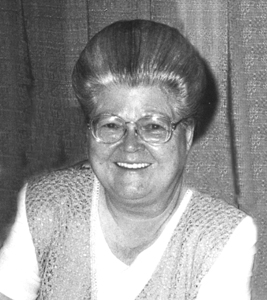NEWS FROM THE HILLS : NOT LIKE GRANDMA DID IT
 November has left us, but in a last good will gesture she is sending a few warm days to welcome December. This is the bridge between autumn and winter, and as we cross over it, we leave behind the brown, tattered remnants of November and greet the white, wintery days ahead.
November has left us, but in a last good will gesture she is sending a few warm days to welcome December. This is the bridge between autumn and winter, and as we cross over it, we leave behind the brown, tattered remnants of November and greet the white, wintery days ahead.
The chill winds of November have stripped the trees of the last of their autumn finery; their bare limbs shiver in the cold. Gone are the songbirds; gone are the katydids. The melancholy chirping of the crickets is stilled, and woolly worms creep now where their fiddles once played a mournful melody. The landscape is often covered with white frost, and a skim of ice forms in water puddles.
The comforting sight of wood smoke curling above country chimneys attest to the cheery fire burning inside, and the frosty air is scented by the homey smell. We hurry through last minute chores, eager to return to the warmth of the house. It is time to move indoors, and get prepared for the onslaught of winter.
These last few weeks have been spent in preparing for cold weather. In fact, in the country, our summer is geared toward getting ready for the cold winter months. We spend the warm months planting and harvesting food to put up for winter, when the flourishing garden is but a memory. Mom used to tell us youngsters that she was canning food for “the snowy days.” We still raise a garden with an eye toward putting away supplies for the winter.
There is nothing to compare with the assurance of a full cellar and piles of firewood, stacked and covered for winter’s use. In our own cellar, there is row after row of canned vegetables, potatoes in the bin, and a deep freezer with our own pork and beef.
I can imagine how our pioneer forefathers felt when they were ready for winter. With their log cabins chinked with mud to keep out the icy winds, the backlog cut for the fireplace, and heaps of wood stacked against the cabin wall, they would be assured of life-giving heat.
In their attics, they would hang bunches of dry onions by their tops, sprays of dried herbs for medicinal uses, and leather britches threaded on a string. Pork and wild meat were salted down and hung in the smokehouse, and sausage was fried down, placed in a crock or churn, and covered with melted lard. They had to dry or pickle most of their food for winter. It wasn’t an easy life by any means, but it was a matter of survival.
We used to can our sausage, placing it in a quart jar and sealing it with lard. Taken out of the jar and fried on a cold winter morning, along with hot biscuits, it was fit for a king’s table. Mom also canned pork ribs and backbones together, and it was country food at its best.
Daddy usually butchered around Thanksgiving Day, and sometimes on that day. I dreaded helping to work up the meat. We ground sausage and lard on an old hand grinder, which was a tiresome and arm-aching job. When Mom rendered the lard, it left a cloying smell in the kitchen and grease was everywhere. She would put the pork rinds in a pan and render them in the oven. Those crispy pork rinds were the best thing in a hog—to a kid, anyway.
She would caution us about eating too much fresh pork, and would fix cooked apples or applesauce to eat with it. When we finished grinding the pork, she would dig some fresh horseradish and have us grind it. With a little salt and vinegar, it made a tasty condiment. It would sure clear your sinuses when you ground it though!
Nowadays, of course, we are not dependent upon the work of our hands in order to survive. If the time would come when we had to depend upon our own resources, we older folk would know how to do it. Too many of our younger generation doesn’t have a clue.
With modern supermarkets on every corner, offering a dazzling array of foods, we can buy everything we need. However, for us raised in the country and nourished by country food, store bought goods are just not the same. Commercial products cannot compare with home-canned green beans, kraut made in a churn, and plump, cold-packed tomatoes. The additives in store bought food is scary, to say the least.
As cold weather drives us indoors, many of us get an urge to bake. The oven adds more warmth to the cozy house, and the spicy fragrance of cakes and pies speaks a hearty welcome to those who come in out of the cold. I hear an echo of Grandma’s day as I cook a fresh pumpkin for pies, although Grandma never had it this easy.
Gone are the days when I took a knife and peeled the rind—with many a blister. All you have to do is cut the pumpkin open, remove the seeds, and cook chunks of it in the microwave oven (on high) until tender. The pulp can then be scraped out with a spoon. I put the pulp in the food processor for a few minutes, although a blender or mixer would work just as well.
It is time to get out the quilting frames for those who make quilts, time to relax and read, and pursue some of the hobbies that had to be shelved by summer’s work. This has always been my favorite time of the year, and Thanksgiving Day was a bonus.
We have a few odds and ends to clear up before the start of the Christmas season. Elma Jarrell of Danville sent the poem “The Corn Song” by John Greenleaf Whittier. It brought back memories of Mom reciting, “Heap high the farmer’s wintery hoard! Heap high the golden corn! No richer gift for autumn poured, from out her lavish horn!”
Ruby Ramsey Myers of Conway, SC wrote about parching corn when she was a child. At 88, she was one of 11 children, born and raised in Clay County. She added, “We didn’t have potato chips or Fritos!”
The only response I received for the request for sulphured apples (from Phyllis Carroll of Gassaway) came from Bonnie Kirby of Alderson. She said her grandmother put peeled and sliced apples in a crock, and set a saucer of sulphur on top of the apples. She lit the sulphur with a match until it made a smouldering smoke. It was then covered with several layers of white cloth. They had to be soaked before using.
Let us thank the good Lord that we don’t have to do things the way Grandma did!
- DAD’S LOVE - July 3, 2020
- HUNTING FOR “MERKLES” - April 24, 2020
- THE SEASON OF GOLD – News From The Hills - November 8, 2019


